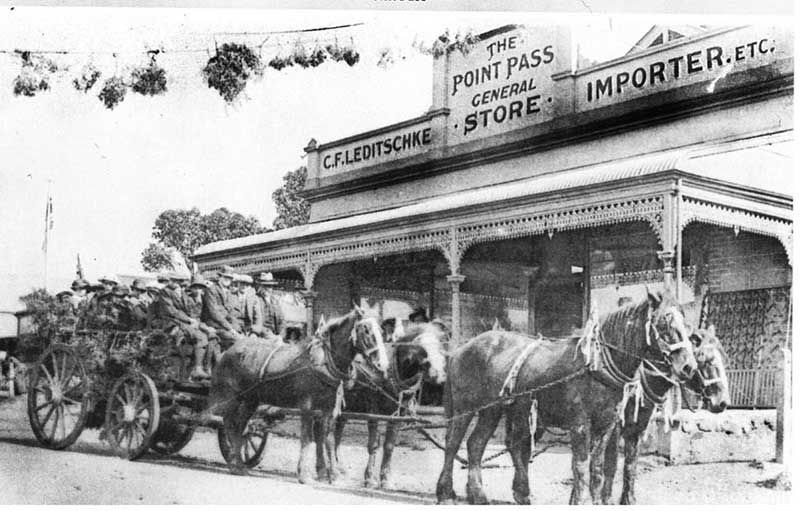
Midway between Eudunda and Robertstown en route to larger copper mining town Burra, Point Pass was once a watering point on the Travelling Stock Route and a significant town in its own right. This would have been the route taken in the 1840s by many overlanders bringing sheep down to South Australia from New South Wales via Big Bend (Morgan). Land along the early stock route between Point Pass and Eudunda was resumed for small farming blocks in the 1880s and 1890s. Point Pass is only slightly west of the Goyder line, beyond which land is considered unsuitable for farming, so success on the land was always going to be difficult to achieve. Most who tried, and almost inevitably failed, were German settlers who pioneered the region, eeking out a living off the semi-arid lndscape.
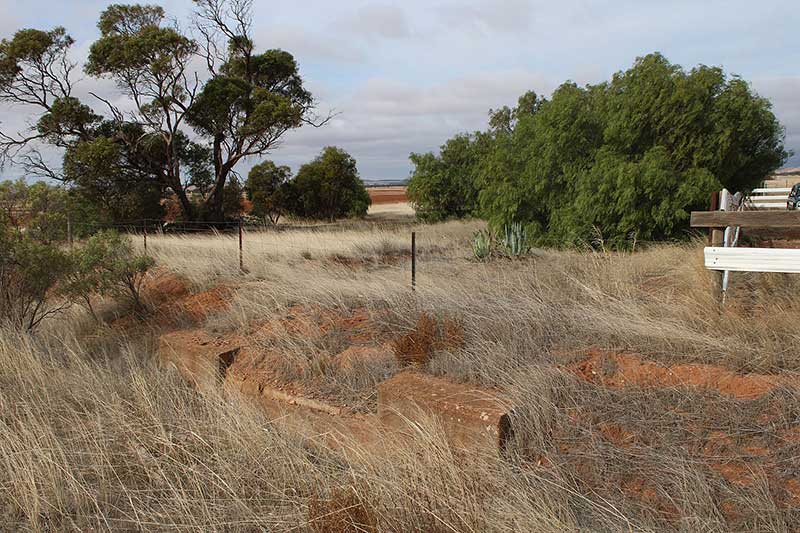
Railway corridor, Point Pass
The town's hotel was built in 1876, as was the General Store of Carl Friedrich Leditschke. In 1906 he built a new store which still stands. The private German school was opened by him in 1881. The school closed in 1945 along with many others in the district as Eudunda Area School was established. Trains used to take children from the state school for an annual picnic to Semaphore to see the beach. This happened long after the arrival of the spur line from Eudunda to Robertstown in 1914. St. Peter’s Lutheran Church was dedicated in 1885 with the nearby manse completed in 1887. Sernons were first held in English in 1926 but German language services did not completely cease until 1939. St. Mary’s Anglican Church was started in 1895 but not completed until 1906. Near St Mary’s church is a town memorial and a standpipe from the old springs.
The former Immanuel College and Seminary near Point Pass form an important part of South Australia’s Lutheran heritage. The college was a Lutheran seminary and the head of one of the two major Lutheran synods in Australia (ELSA- Evangelical Lutheran Synod of Australia). It opened in 1894 for the training of Lutheran pastors. The college building was extended in 1899 and again in 1914. Just after the founding pastor George Leidig retired in 1920, the Seminary and College was moved from Point Pass to its current headquarters in North Adelaide (1921). The Lutheran Seminary remains in North Adelaide.
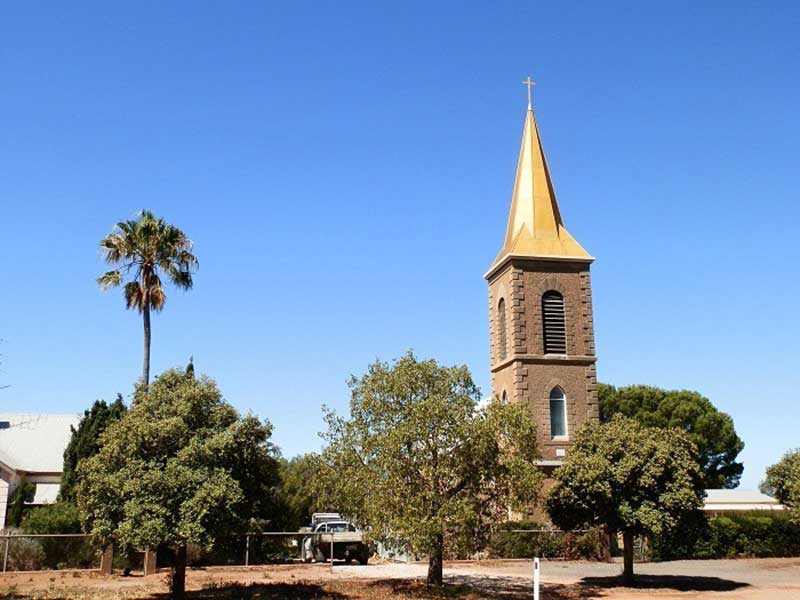
Point Pass Evangelical Immanuel Church
The former Immanuel College and Seminary is today privately own and was run as a bed and breakfast establishment for many years. As well as the seminary this site also had one of the first Lutheran churches in the region. The impressive Point Pass Evangelical Immanuel Church was built in 1876. The gold topped bell tower and spire were added in 1913. The church contains an historic Lemke pipe organ built in the Barossa Valley by Lemke in 1876. Behind the church is a Lutheran cemetery and beside the church is the Immanuel School. The stone school building was erected in 1909.
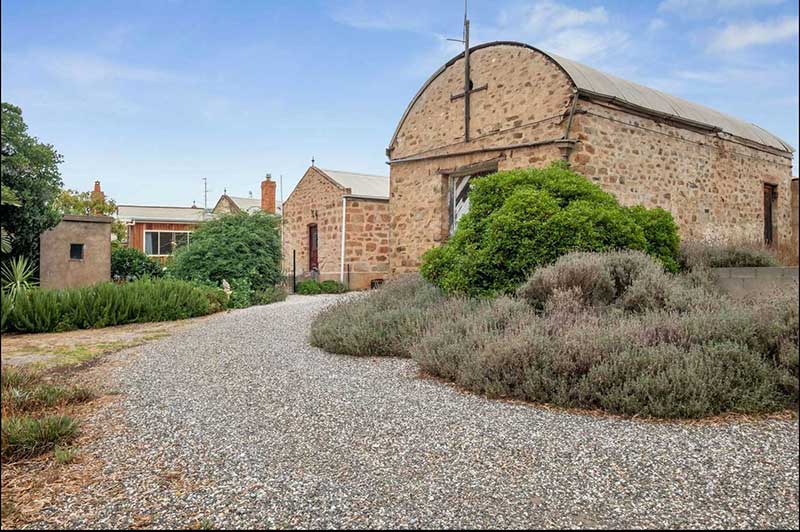
The town's old Leditschke butter factory (above), a landmark rounded stone building at Mo.9 main street of Point Pass, was built in in 1871 as a wheat and wool depot. It became a cheese factory in 1901, but was closed in 1915. From its beginnings to being a general store, a wine shop and then a residence, it was the area's pre-eminent retail establishment.
Point Pass is on the Worlds End Highway, and was previously a stop on the Robertstown-Eudunda railway line which opened in 1914. Once the railway closed, it ceased to be a thriving town. howewver it still has an active hotel and Lutheran church. The Lutheran church is now part of the "Eudunda Robertstown Lutheran Parish", which includes Lutheran churches at Robertstown, Point Pass, Geranium Plains, Eudunda, Neales Flat and Peep Hill.
For a town that was a a strongly German settlement, it is unusual that it should have a name of Irish origin. Point Pass was named in 1867 by one of its first residents, Anne Richards. The town was sited here because of a water spring and it was named after a locality in Ireland known to Anne called Poynzpass, after he home town in Ireland. Anne arrived in South Australis as Anne Redpath in 1853. Her Irish husband died in 1856 leaving her with a two month old child to support. She remarried two months later in Kapunda before moving to this new location 11 years later.
Poet and tutor, Paul Gotthelf Pfeiffer, (also known as P. G. Pfeiffer), was born at Point Pass on 5 December 1916. He was schooled at Australia Plains before later boarding at Immanuel College, Adelaide, while attending the University of Adelaide. He received a Bachelor of Arts in 1938, Honours in 1939, and Masters in 1940. His poem titled Spain won the Bundey Prize for English Verse at the University of Adelaide in 1940. Along with Max Harris, Paul was also the founder of the Angry Penguins journal. He enlisted in the RAAF in July 1940, but did not survive the war, dying on 3 January 1945, in Invergordon, Scotland.

Australia Plains
Australia Plains is a small town that drew its name from "Australia Hutss" which appeared on old pastoral lease plans. All public services in the town are now closed, leaving it virtually a ghost town. The post office operated from 1 April 1882 to 31 May 1971. A public school at Australia Plains operated from 1917 until 1956, replacing an earlier Lutheran school that was forced to close during World War I.
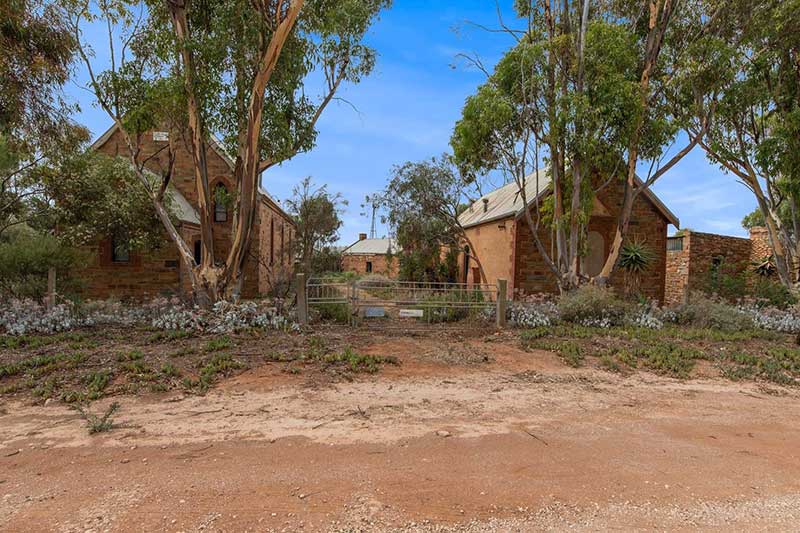
The complex of stone buildings at 1005 Australia Plains Road, Australia Plains, was stablished in 1894 as the St Johannis Lutheran Church up until the it wassold for conversion into a private residence in the 1970s. The property also features the old Sunday school built in approximately 1907, that is now used as an art studio.




